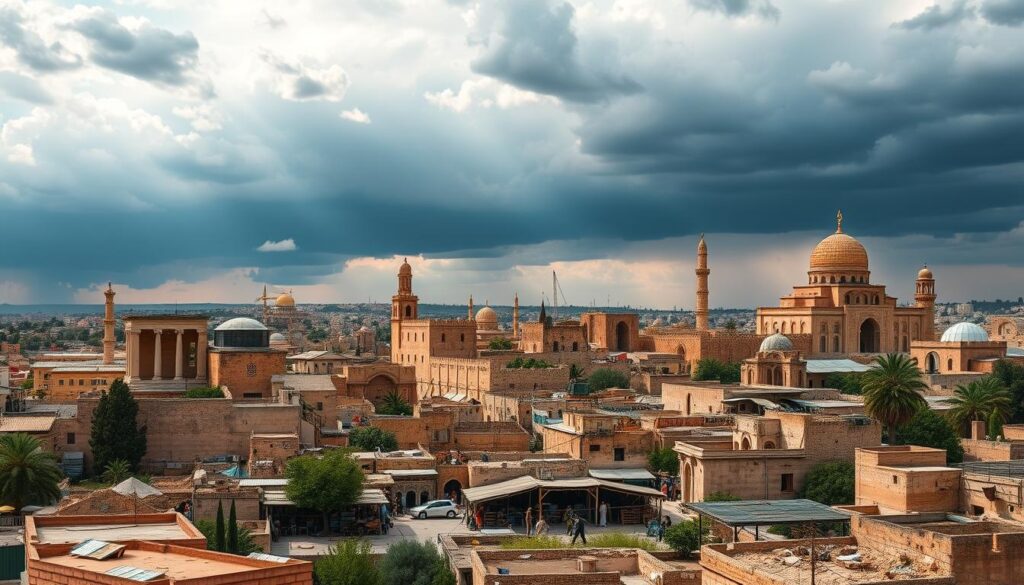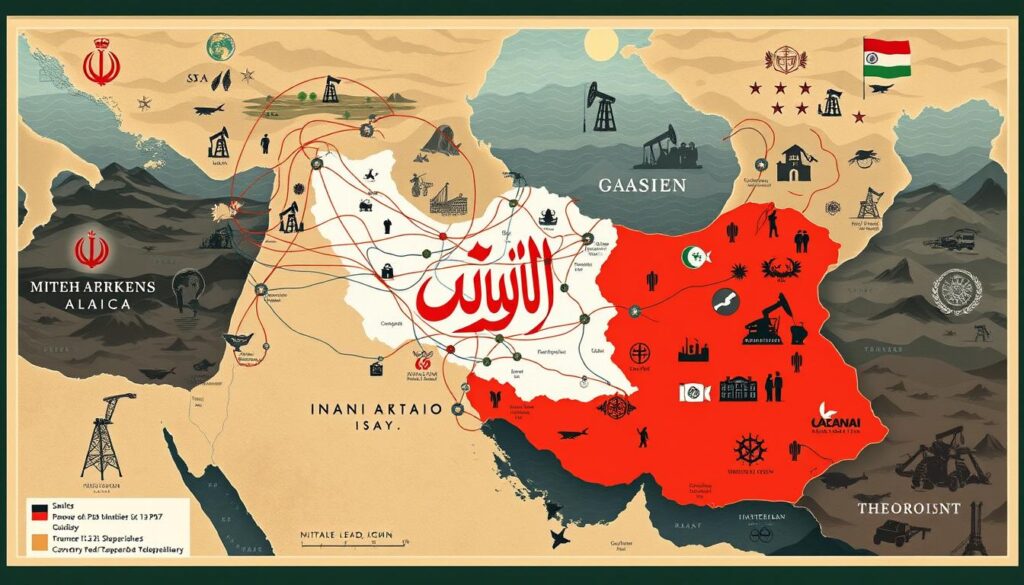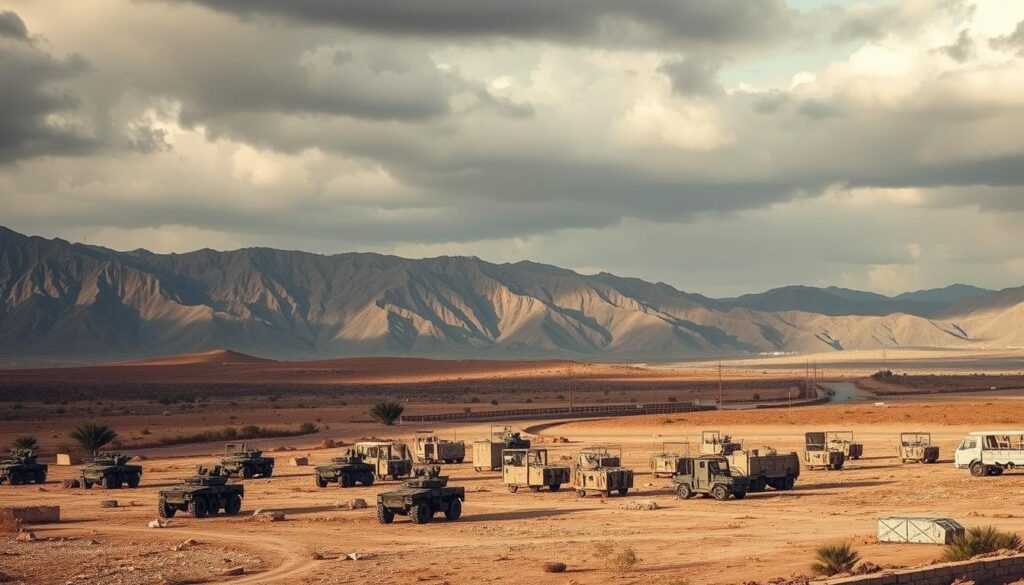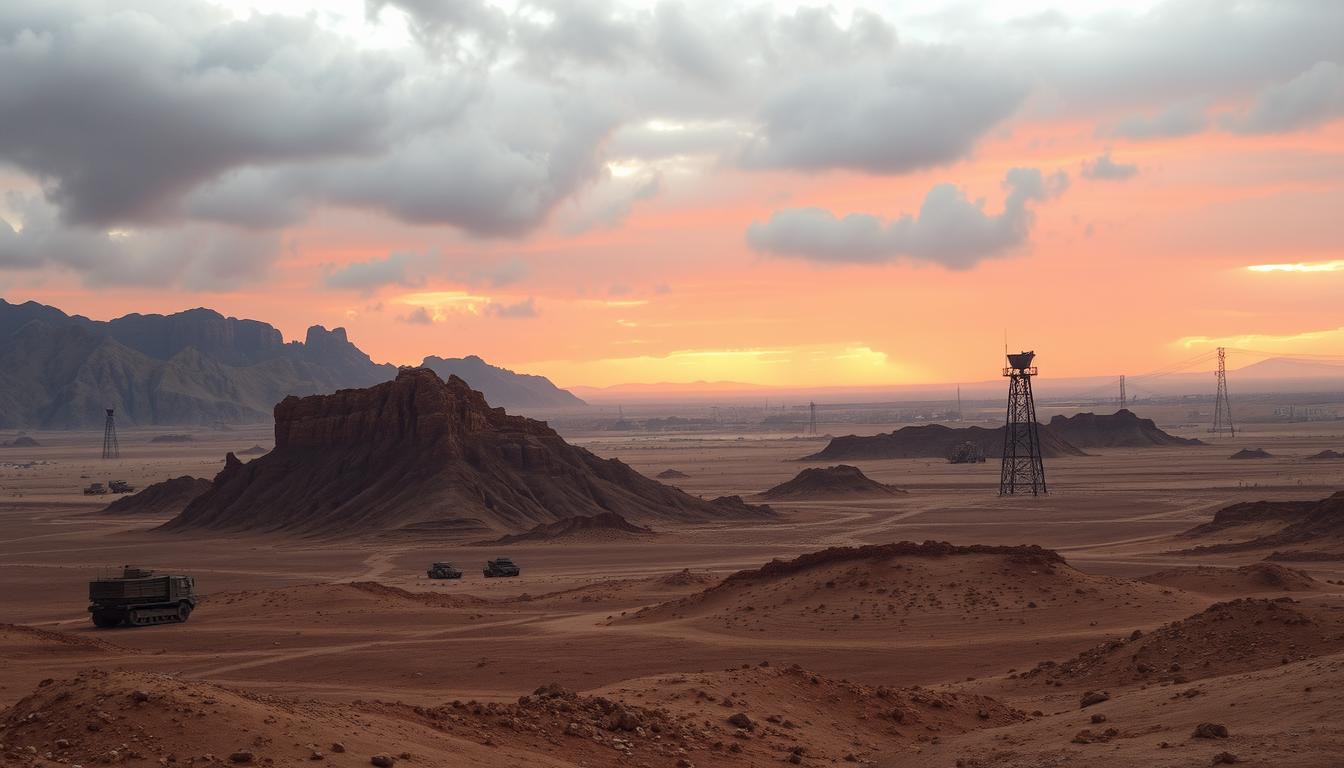In the heart of the Middle East, a complex geopolitical dance has been unfolding. Lebanon, Israel, and Hezbollah are at the center of a spiraling conflict. The story began in Tyre, where Ali Karaki, a young father of three, was settling in for the evening with his family. The rumble of rocket fire shattered the stillness, as Hezbollah launched a barrage against Israel. This set off a chain reaction that has sent ripples throughout the region.
As the conflict escalated, tensions between the middle east conflict, lebanon israel hezbollah, and the geopolitics of the situation became increasingly palpable. The terrorism and proxy war unfolding had the potential to ignite a much larger islamic militancy crisis. The influence of shia muslim powers like iran and hamas loomed large.
For the Karaki family and countless others like them, the threat of a regional hezbollah vs hams conflagration had become all too real. As the isreal military responded with airstrikes on beirut, the iran-backed militias and shia muslims in Lebanon found themselves caught in the crosshairs. This raised the specter of a broader syrian civil war-like scenario unfolding.
Key Takeaways
- The conflict between Lebanon, Israel, and Hezbollah has escalated, with Hezbollah launching rocket attacks on Israel and Israel responding with airstrikes on Hezbollah targets in Lebanon.
- This has led to a significant humanitarian crisis, with thousands of civilians displaced and infrastructure damage.
- The conflict has broader geopolitical implications, with Iran’s influence and the potential for a regional conflagration being key concerns.
- The situation has the potential to ignite a much larger crisis, with the involvement of various regional and global powers.
- The threat of a regional conflict has become all too real for the civilians caught in the crossfire.
Hezbollah Rocket Attacks on Israel
The conflict between Hezbollah and Israel has escalated, with Hezbollah launching a barrage of rockets at various locations in northern Israel. These hezbollah rocket attacks have heightened concerns and unrest in the area.
Targets and Casualties
Hezbollah’s rocket attacks have targeted military installations, an airbase, and a munitions factory. Israeli missile defense systems have intercepted many rockets, but some buildings have been damaged. A regional hospital has also been impacted, showing the indiscriminate nature of these attacks.
Retaliation from Israeli Forces
In response, the Israeli military has launched airstrikes, tank, and artillery fire on Hezbollah targets in southern Lebanon. This israeli retaliation has increased the conflict’s intensity, leading to significant casualties on both sides. The Lebanese health ministry has reported over 550 people killed and 1,835 injured due to the ongoing middle east conflict.
| Incident | Targets | Casualties |
|---|---|---|
| Hezbollah Rocket Attacks | Military Installations, Airbase, Munitions Factory | Damaged Buildings, Regional Hospital Impacted |
| Israeli Retaliation | Hezbollah Targets in Southern Lebanon | Over 550 People Killed, 1,835 Injured |
The hezbollah rocket attacks and israeli retaliation have escalated the middle east conflict, raising concerns about further destabilization in the region.
Historical Context of the Conflict
The ongoing tensions between Lebanon, Israel, and Hezbollah stem from the Middle East’s intricate history. Hezbollah, a Shia Muslim militant group, was founded in 1983. It aimed to resist the Israeli occupation of southern Lebanon, backed by Iran. Over time, Hezbollah has significantly influenced the conflicts between Israel and Lebanon, molding the region’s volatile political scene.
Origins of Hezbollah
Hezbollah, meaning “Party of God,” emerged following the 1982 Israeli invasion of Lebanon. It was inspired by the Iranian Islamic Revolution. The group’s primary goal was to expel Israeli forces from Lebanon and establish an Islamic state. Supported by Iran’s Revolutionary Guards, Hezbollah rapidly grew, becoming a significant force in Islamic militancy.
Israel’s Past Conflicts with Lebanon
- The 1982 Lebanon War, also known as the First Lebanon War, saw Israel invade Lebanon and occupy its southern part.
- In 2006, the Second Lebanon War began, with Hezbollah launching rocket attacks on Israel. Israel then launched a military campaign against Hezbollah and Lebanon’s infrastructure.
- These historical israel-lebanon conflicts have fueled ongoing tensions and instability. Hezbollah’s presence and origins are central to these issues.
The middle east history and the role of shia muslims have deeply influenced the conflict between Lebanon, Israel, and Hezbollah. This makes the issue complex and multifaceted, with roots in history.

Geopolitical Implications
The conflict between Lebanon, Israel, and Hezbollah has profound geopolitical implications. Iran’s role and influence are key factors. Iran, a strong supporter and supplier of Hezbollah, is seen as a major player. Its actions could escalate the situation further in the middle east geopolitics.
This conflict is often seen as a proxy war between Iran and its allies versus Israel and its western allies. Iran’s backing of the shia muslim militant group Hezbollah has heightened tensions. It empowers Hezbollah to launch iran influence attacks against Israel, worsening the lebanon israel conflict.
Iran’s Role and Influence
Iran’s involvement in the conflict is complex. The country has given Hezbollah significant financial, military, and logistical support. This support has made Hezbollah a powerful force, capable of launching rocket attacks and other operations against Israel.
“Iran’s support for Hezbollah is a key factor in the ongoing tensions between Lebanon, Israel, and the broader middle east geopolitics.”
Moreover, Iran’s influence goes beyond direct support for Hezbollah. Its regional ambitions and desire to project power in the Middle East contribute to the proxy war dynamic. Iran seeks to counter Israel and its western allies’ influence in the region.

The geopolitical implications of the Lebanon-Israel-Hezbollah conflict are complex and multifaceted. Iran’s role and influence are central. As the situation evolves, the risk of further escalation and regional instability remains a significant concern.
lebanon israel hezbollah
The ongoing conflict between Lebanon, Israel, and Hezbollah is deeply entrenched and complex. It stems from decades of hostility, with Hezbollah’s rocket attacks on Israel and Israel’s airstrikes on Hezbollah targets in Lebanon being the latest escalation. This middle east conflict continues to intensify.
At the core of this dispute is Hezbollah, a powerful Islamic militant group in Lebanon. Backed by Iran, Hezbollah has been waging a long conflict with Israel. It has launched numerous rocket attacks and engaged in terrorism against Israel.
Israel has retaliated with airstrikes and military actions targeting Hezbollah’s infrastructure and personnel in Lebanon. This cycle of violence threatens to escalate further, potentially drawing in the United States and its allies.
| Factors Driving the Conflict | Impacts on the Region |
|---|---|
|
|
The lebanon israel hezbollah conflict remains a pressing issue. The international community is watching closely, seeking diplomatic solutions to de-escalate tensions and resolve this longstanding dispute.

“The conflict between Lebanon, Israel, and Hezbollah is a complex and evolving situation that has the potential to destabilize the entire Middle East region.”
Humanitarian Crisis in Lebanon
The conflict between Lebanon, Israel, and Hezbollah has led to a severe humanitarian crisis. Thousands of civilians have been displaced, seeking refuge in safer areas. The Israeli airstrikes have ravaged Lebanon’s infrastructure, including homes, businesses, and public facilities. This has worsened the plight of the Lebanese people.
Displacement of Civilians
Thousands of Lebanese civilians have been displaced, many taking shelter in schools and community centers. They face uncertainty, limited access to necessities, and emotional trauma. The challenge of providing shelter, food, and medical care for the displaced is immense for the Lebanese government and aid organizations.
Damage to Infrastructure
The conflict has severely damaged Lebanon’s infrastructure. Airstrikes have hit homes, roads, power plants, and other critical facilities. This has disrupted essential services, making it hard for people to access basic necessities and receive vital services.
| Sector | Damage Estimates |
|---|---|
| Housing | Over 15,000 homes damaged or destroyed |
| Transportation | Numerous roads, bridges, and airports damaged |
| Electricity | Significant disruptions to power supply across the country |
| Water Infrastructure | Damage to water treatment and distribution systems |
The humanitarian crisis in Lebanon is a pressing concern. The displacement of civilians and infrastructure damage have overwhelmed the government and aid organizations. Meeting the immediate needs of the affected population and rebuilding vital systems are crucial to alleviate suffering and restore normalcy.
International Response
The world has reacted with deep concern to the escalating conflict between Lebanon, Israel, and Hezbollah. Leaders worldwide stress the urgent need for de-escalation and a diplomatic solution. This is to prevent the situation from spiraling into a full-scale war with catastrophic outcomes.
UN Security Council Involvement
The UN Security Council has been actively engaged in discussions to address the conflict. There have been demands for an emergency meeting to discuss the situation. The aim is to explore diplomatic avenues for a ceasefire and a lasting resolution. Yet, the diplomatic efforts so far seem to have had little effect, as the fighting persists.
| Country | Response |
|---|---|
| United States | Called for an immediate ceasefire and urged all parties to exercise restraint. |
| United Kingdom | Expressed concern over the violence and emphasized the need to respect Lebanon’s sovereignty. |
| France | Condemned the attacks and called for a return to dialogue and negotiations. |
| Russia | Urged all sides to exercise maximum restraint and avoid further escalation. |
The international response to the Lebanon Israel conflict has been marked by calls for de-escalation and diplomatic solutions. These efforts aim to address the middle east diplomacy challenges. Despite the UN Security Council‘s active involvement, the diplomatic efforts have shown limited success so far, as the violence continues.
“The international community must act swiftly and decisively to prevent this conflict from spiraling out of control and causing unimaginable consequences for the region and beyond.”
Potential for Escalation
The ongoing conflict between Lebanon, Israel, and Hezbollah poses a significant risk of escalation. This could lead to a broader regional conflict. The desire for a wider war in Israel, along with the potential for Iran and its proxies to become more involved, heightens the danger of a regional conflagration.
Risk of Regional Conflict
The geopolitical implications of this conflict are far-reaching. The involvement of regional powers like Iran and the potential for Hezbollah to retaliate with missile strikes on Israeli cities could spark a wider conflagration in the Middle East. The risk of a regional conflict is a grave concern, as it could destabilize the entire region and have far-reaching consequences for global peace and security.
US and Allied Involvement
The United States and its allies have expressed concerns about the situation and have called for restraint. However, their involvement and potential actions could also contribute to the escalation of the conflict. The US has long-standing ties with Israel and has provided significant military and financial aid, which could draw it deeper into the conflict. Additionally, the US and its allies’ support for the Lebanese government and their efforts to counter Iranian influence in the region could further complicate the geopolitical dynamics.
The potential for escalation in this conflict is a serious concern. The risk of a regional conflict and the involvement of global powers like the US add to the complexity of the situation. Navigating this delicate balance will require careful diplomacy and a commitment to de-escalation on all sides.
| Potential Escalation Factors | Implications |
|---|---|
| Desire for wider war in Israel | Increased risk of regional conflict |
| Involvement of Iran and its proxies | Heightened tensions and instability in the Middle East |
| US and allied involvement | Potential for further escalation and global implications |
“The risk of a regional conflict is a grave concern, as it could destabilize the entire region and have far-reaching consequences for global peace and security.”
- Careful diplomacy and commitment to de-escalation are crucial to mitigate the potential for escalation.
- Monitoring the involvement and actions of regional and global powers will be crucial in understanding the evolving dynamics of the conflict.
- Maintaining open lines of communication and seeking diplomatic solutions will be essential to prevent the conflict from spiraling out of control.
Diplomatic Efforts for De-escalation
As tensions between Lebanon, Israel, and Hezbollah escalate, diplomatic efforts aim to de-escalate the conflict. The United Nations Security Council is urging restraint and dialogue for a peaceful resolution. Diplomats from various nations are working hard to facilitate negotiations, urging parties to prioritize regional stability.
The conflict’s complex history and differing interests make diplomatic success uncertain. Despite international calls for de-escalation, fighting continues unabated. Experts fear a wider regional conflict, given the situation’s volatility and unpredictability.
The world holds its breath, hoping diplomacy will prevail. A sustainable ceasefire and lasting peace in the Middle East are the goals. The resolution of this conflict would benefit local populations and enhance regional stability and security.
FAQ
What is the current conflict between Lebanon, Israel, and Hezbollah about?
The conflict has escalated, with Hezbollah launching rocket attacks on Israel. Israel has responded with airstrikes on Hezbollah targets in Lebanon. This has caused a significant humanitarian crisis, displacing thousands and damaging infrastructure. The situation has broader geopolitical implications, with Iran’s influence and the risk of a regional conflagration being key concerns.
What are the details of the recent rocket attacks and retaliation?
Hezbollah has launched dozens of rockets into northern Israel, targeting military installations and a munitions factory. Israeli missile defense systems intercepted many rockets, but several buildings were damaged. A regional hospital was also impacted. In response, Israel has launched airstrikes, tank, and artillery fire on Hezbollah targets in southern Lebanon.
What is the historical context of the conflict between Lebanon, Israel, and Hezbollah?
Hezbollah was founded in 1983 with Iranian support. It has been a key player in conflicts between Israel and Lebanon. Israel’s long history of military involvement in Lebanon, including the 2006 war, has contributed to ongoing tensions.
What are the geopolitical implications of the conflict?
The conflict is seen as a proxy war between Iran and its allies and Israel and its western allies. Iran, which supports and equips Hezbollah, is a key player. Its actions could escalate the situation further.
What is the humanitarian impact of the conflict in Lebanon?
The conflict has devastated the civilian population in Lebanon, with thousands fleeing their homes. Israeli airstrikes have caused significant damage to infrastructure, including homes, businesses, and public facilities.
How has the international community responded to the escalating conflict?
The UN Security Council has been involved in discussions, aiming to convene an emergency meeting. However, diplomatic efforts so far have had little impact, as the fighting continues.
What is the potential for further escalation of the conflict?
The conflict between Lebanon, Israel, and Hezbollah has the potential to escalate further. The risk of a broader regional conflict is a significant concern. The US and its allies have expressed concerns and called for restraint, but their involvement could also escalate the conflict.
What are the diplomatic efforts to de-escalate the conflict?
Diplomatic efforts are underway to de-escalate the conflict. The UN Security Council has been involved, and there are calls for restraint and dialogue. However, the success of these efforts is uncertain, as the fighting continues and parties have divergent interests.
